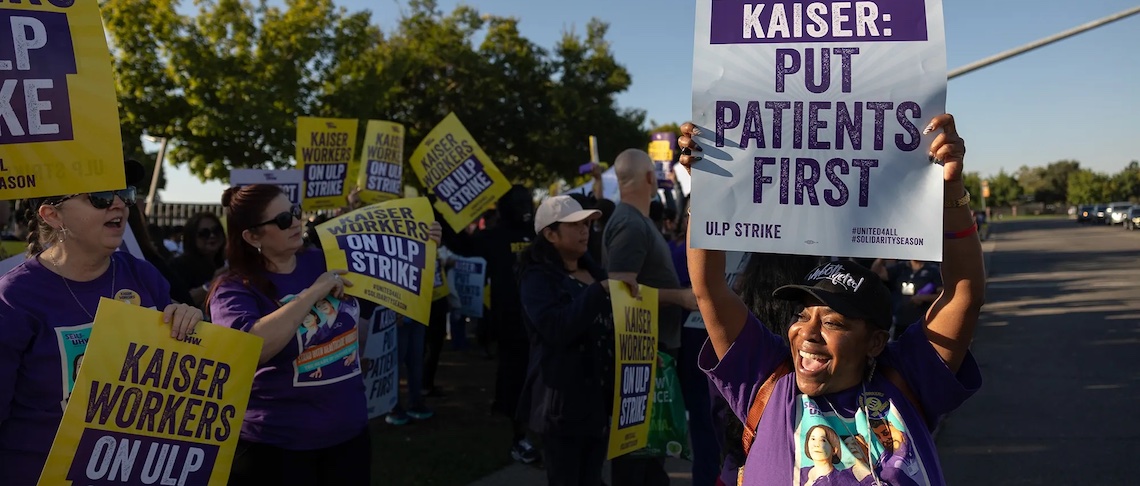
Kaiser Permanente employees on strike on Oct. 4, 2023. The workers held a demonstration in front of the Kaiser Permanente South Sacramento location. Photo by Miguel Gutierrez Jr., CalMatters
Written by Kristen Hwang with CalMatters
More than 75,000 Kaiser Permanente employees walked off the job this morning, initiating the largest health care worker strike in U.S. history, union officials said.
Kaiser and the Coalition of Kaiser Permanente Unions were unable to reach a deal during a marathon bargaining session in San Francisco Tuesday. The coalition represents eight unions in five states and the District of Columbia. More than 90% of its members work in California facilities where the health care giant serves more than 9 million patients.
Those who walked out include nursing assistants, house keepers, X-ray technicians, phlebotomists, pharmacists, optometrists and other support staff. The strike is expected to last through Saturday morning. Doctors and most nurses are not part of the strike.
“Healthcare workers are taking the work action to protest Kaiser executives’ bad faith bargaining, which is getting in the way of finding solutions to solve the Kaiser short-staffing crisis,” according to a statement from Service Employees International Union-United Healthcare Workers West, the largest of the coalition’s unions.
Workers’ contracts expired over the weekend. Other impacted states include Colorado, Washington, Oregon, Virginia and Washington, D.C.
Health care workers are required by federal law to give employers 10-days advance notice of a strike. Kaiser executives said facilities are prepared to continue operating during the strike.
Contract talks continue
In a statement, Kaiser said it made agreements with the union coalition on several proposals Tuesday but did not specify on which issues. Both parties remain at the bargaining table, according to the statement.
“We remain committed to reaching a new agreement that continues to provide our employees with market-leading wages, excellent benefits, generous retirement income plans, and valuable professional development opportunities,” the statement said.
The union coalition began bargaining six months ago, advocating for a $25-per-hour minimum wage for all workers and a 24.5% raise over four years for employees in all of Kaiser’s labor markets. The coalition also said facilities are dangerously understaffed and has accused Kaiser of unfair labor practices for failing to share information needed for bargaining, such as staffing numbers.
Kaiser maintains its employees have the best salaries and benefits among competitors in each state that it operates in and that the strike is unjustified. It has offered raises of 12.5% to 16% over four years depending on state and a $21 minimum wage, although California workers have been offered a $23 minimum wage.
Some services delayed during Kaiser strike
Although Kaiser hospitals and emergency departments will remain open, non-urgent appointments and procedures may be delayed, Kaiser said in a statement to patients. Kaiser recommends that patients check whether their local facilities are affected by the strike. Some pharmacies might close temporarily or reduce hours during the walkout.
Kaiser, the largest private insurer in the state, operates three dozen hospitals and more than 500 medical offices in California.
Last year, Kaiser’s mental health workers in Northern California striked for 10 weeks over caseloads and long wait times. The strike coincided with a state investigation into whether the health insurer was providing members timely and adequate access to appointments. That investigation is ongoing, a spokesperson for the Department of Managed Health Care told CalMatters.
Originally published at CalMatters.org. Supported by the California Health Care Foundation (CHCF), which works to ensure that people have access to the care they need, when they need it, at a price they can afford. Visit www.chcf.org to learn more.








